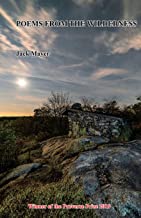Poems From the Wilderness by Jack Mayer 2019
Why does a book of poetry delight and engage one? In this case, I must admit that I was primed by Mayer’s brief bio—a pediatrician who chose to practice in small, underserved, rural communities in Vermont; a New York Jew who remembered his grandma’s hands ‘soft as challah’ and went to medical school at about the same time that I did; an inveterate hiker of the Long Trail, the 272 trail that runs from Massachusetts to Canada along the spine of the Green Mountains that I’ve now hiked one third of; a lover of nature and a close observer of the changing seasons and the cycle of birth and death in the Vermont woods as well as his own.
But identifying with the poet isn’t enough. The words have to touch you, speak truth, move your spirit, and Mayer’s work did all of those. He wrote these poems between May, 1993 and July, 2018 while hiking the Long Trail, writing at the end of a day in the woods and at the tops of the Greens. He wrote them in shelters with names that evoke past Long Trail pioneers, local mountaineers, and donors—-Maeve Binchy, Bettell, Sucker Brook, Glen Ellen, and most of all his beloved Mt. Abraham.
Divided into sections labelled Forest, Trail, Physics, Spirit and Music the brief poems translate his feelings of awe and time, of birth and decay, of ‘nesting spheres of beauty’ into words for NOBOS (north-bound hikers) and SOBOS (south-bound hikers) and for us. With the exception of occasional references to his childhood in New York City and several poems about his experience in a choral group that sings to hospice residents, Mayer is all about the beauty and cycles of Vermont’s mountains. Odes to his old camp stove, his boots with the sole that ‘separated from the leather’, and his compass ‘scuffed and dented’ nestle in his close observation of nature’s beauty, its cycles, and the lessons they hold for us as we move along the ‘Long Trail odyssey/from diaper to shroud’. Boots is a favorite:
Mayer’s book won the Proverse Prize in 2019, awarded by the publisher and is supported by back cover blurbs from fellow Vermont writers Jay Parini and John Elder, but even without the prize and the blurbs, this is a fine collection certain to be appreciated and read over and over by anyone who has trod the rocks and mud of the Long Trail or been in touch with their own aging and mortality.



